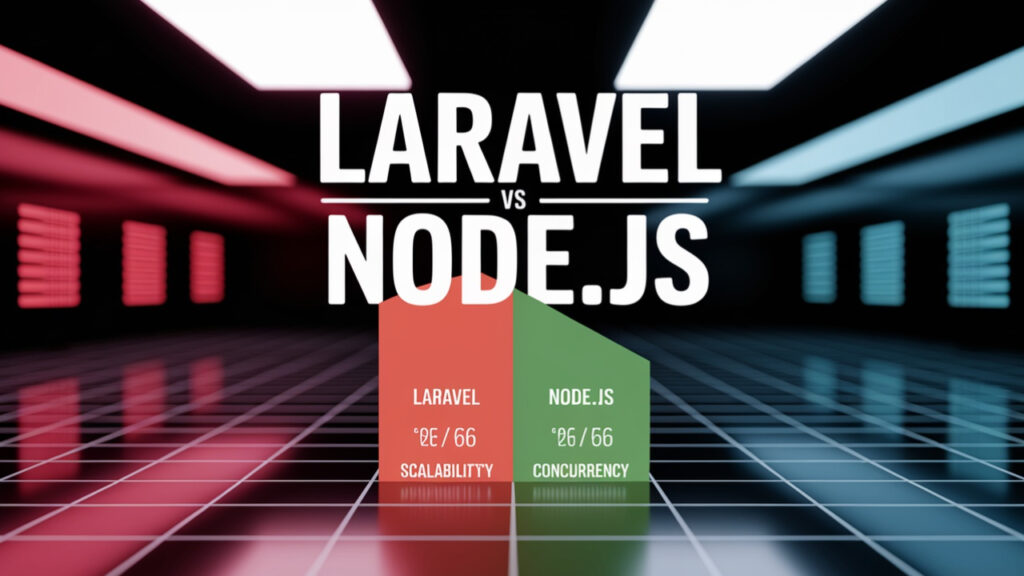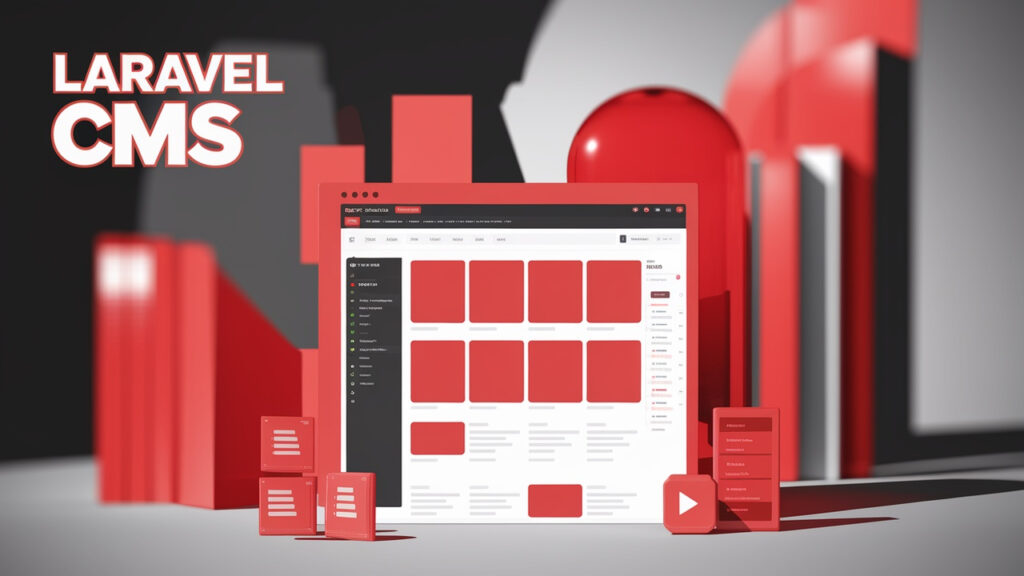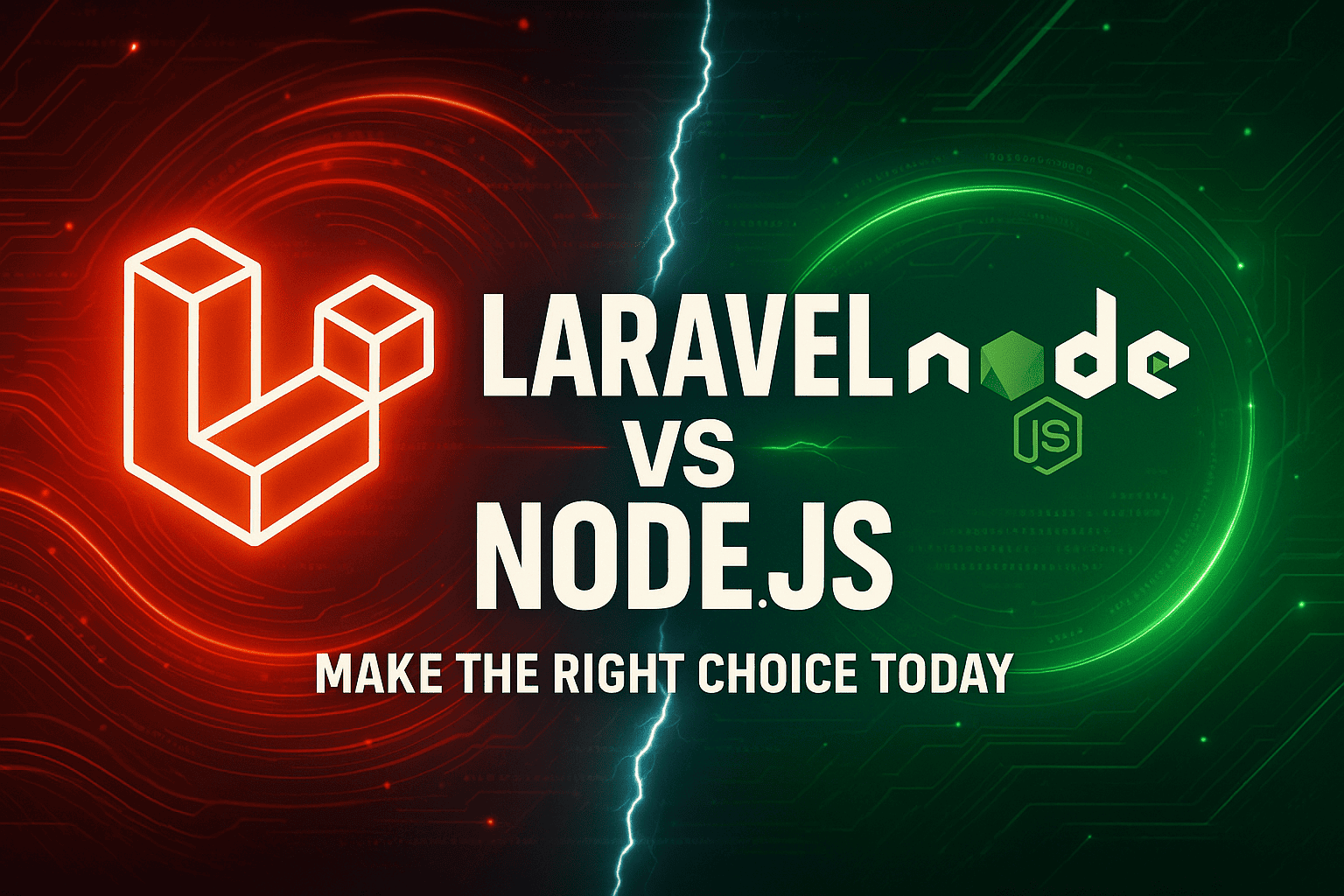Table of Contents
In the ever-evolving digital landscape, developers are constantly faced with critical choices—none more important than selecting the right backend technology for their web applications. As we head deeper into 2025, the debate between Laravel or Nodejs continues to gain traction among web developers, startups, and enterprises.
Whether you’re building the next big SaaS product, a real-time chat platform, or a powerful admin dashboard, choosing between Laravel and Nodejs will significantly influence your development speed, application performance, and scalability.
This guide will give you a clear, comprehensive comparison of Laravel and Nodejs, backed by real-world examples, insights from the developer community, and recommendations based on your use case.
🚀 Laravel and Nodejs: A Quick Recap
🧱 Laravel at a Glance
Laravel is a PHP-based framework built for modern web apps. It offers a Model-View-Controller (MVC) architecture and a rich set of tools including Eloquent ORM, Blade templating, and powerful CLI commands via Artisan. It’s ideal for developers looking for a clean, expressive syntax and rapid application development.
Laravel in 2025 has become more performance-focused with improvements through Laravel Octane, enabling event-driven architecture using Swoole or RoadRunner.
Explore the Laravel ecosystem ➝ Laravel Official Docs
⚙️ Nodejs in a Nutshell
Nodejs allows you to run JavaScript on the server. It’s asynchronous, non-blocking, and built for real-time, scalable applications. In combination with frameworks like Express.js, NestJS, and Fastify, Nodejs powers some of the largest systems today—including Netflix, LinkedIn, and PayPal.
With the JavaScript ecosystem booming in 2025, Nodejs remains a staple for startups and enterprises embracing full-stack JavaScript.
Get started with Node.js ➝ Node.js Documentation
🔍 Laravel or Nodejs: A Feature-by-Feature Breakdown
📌 Syntax and Learning Curve
- Laravel’s syntax is structured, elegant, and beginner-friendly. Its documentation and tutorials (like Laracasts) make it accessible even to new developers.
- Nodejs, while versatile, has a steeper learning curve. You’ll be working with asynchronous callbacks, promises, and different libraries for basic tasks.
Tip: If you’re starting fresh in backend development, Laravel may feel more “guided,” whereas Nodejs offers more “freedom.”
⚡ Performance & Speed

Nodejs shines in handling multiple concurrent requests and real-time data. Its non-blocking I/O is perfect for performance-hungry apps like gaming servers, chat apps, and streaming platforms.
Laravel has made huge strides with Laravel Octane, which introduces concurrency and high-performance server capabilities. Still, it’s more suitable for traditional request/response lifecycle applications.
🎥 Watch in Action:
🧠 Development Experience & Tooling
- Laravel comes with out-of-the-box features: migrations, auth scaffolding, API routing, job queues, event broadcasting, and more.
- Nodejs, on the other hand, gives you modularity—you choose your stack (ORM, templating, etc.), but this means setting up more manually.
Laravel tools you’ll love:
- Laravel Forge & Vapor for deployment
- Livewire and Inertia.js for reactive UIs
- Laravel Mix for asset bundling
In Nodejs, you’ll use tools like:
- PM2 for process management
- Socket.IO for real-time communication
- Webpack or Vite for bundling
🔐 Security Features
Laravel:
- CSRF protection by default
- Input sanitization
- Bcrypt & Argon2 password hashing
- Laravel Sanctum & Passport for authentication
Nodejs:
- Security depends on middleware (e.g., helmet.js, cors, express-validator)
- Developers must manually configure security best practices
Conclusion: Laravel gives you security features out-of-the-box. In Nodejs, you need to be more cautious and deliberate.
📈 Use Case Recommendations: Laravel or Nodejs?

Choosing between Laravel or Nodejs depends heavily on your application type and business logic. Here are ideal use cases for each:
🟩 Ideal for Laravel
- CMS-based platforms
- E-commerce websites
- Admin dashboards
- RESTful APIs for mobile apps
- Projects with relational databases like MySQL/PostgreSQL
💡 Example: If you’re building an e-commerce site like Petals India, Laravel’s blade templates and Eloquent ORM make it super-efficient.
🟦 Ideal for Nodejs
- Real-time chat apps
- Multiplayer games
- IoT dashboards
- Serverless architecture
- Microservices-based platforms
💡 Example: Creating a real-time collaboration app like a Trello clone or Google Docs alternative would work better with Nodejs due to its event-driven design.
🌍 Laravel or Nodejs: Trends & Developer Sentiment in 2025


In 2025, Laravel continues to dominate PHP frameworks. However, JavaScript’s ubiquity means Nodejs remains highly relevant for companies that want full-stack development in one language.
📊 According to GitHub Trends:
- Nodejs ranks consistently among the top 3 most-used technologies.
- Laravel remains in the top 10 repositories under the PHP category.
💬 Community Feedback:
“Laravel is amazing for quick product MVPs. It’s fast to build and scale if needed.”
“Nodejs gives you flexibility, especially when you’re already working with React or Vue.”
For more discussions, check out developer communities like Dev.to, Stack Overflow, and Reddit r/webdev.
🧠 Future Outlook: Laravel or Nodejs in 2026 and Beyond?
Laravel Advancements:
- Laravel Octane’s support for concurrency is expanding.
- Laravel Livewire continues bridging the gap between backend and frontend.
- Laravel is expected to move further into SaaS app ecosystems with Jetstream and Breeze evolving.
Nodejs Advancements:
- Better WebAssembly integration is expected.
- Frameworks like NestJS are introducing powerful TypeScript support with enterprise-level architecture.
- Full support for edge and serverless computing (especially with Deno gaining traction).
The future is not about Laravel or Nodejs, but possibly Laravel with Nodejs—especially in microservice-based architecture.
🛠 Pro Tips: How to Decide for Your Next Project
Still stuck? Here are a few quick decision filters:
✅ Choose Laravel if:
- You need rapid development with minimal configuration.
- You’re working with traditional relational databases.
- Security and structure are your top priorities.
- Your team is already familiar with PHP.
✅ Choose Nodejs if:
- Your app requires real-time features (notifications, chat, etc.).
- You’re building a high-concurrency, low-latency system.
- Your frontend stack is JavaScript-heavy.
- You want better control over your architecture.
🔗 Must-Read Guides to Complement This Comparison
📘 If you’re into productivity and tools to enhance your workflow as a developer, you’ll love:
- ✅ Best Extensions for Visual Studio Code Every Developer Should Use in 2025 – Supercharge your coding with these game-changing VS Code extensions.
- ✅ Top 10 Chrome Extensions for Productivity in 2025 – Discover browser tools that can help you save hours every week.
- ✅ Complete Guide to Getting a Free Domain Name and Hosting in 2025 – Ideal if you’re starting a Laravel or Nodejs side project and want to save on initial costs.
📚 Developer Resources Worth Exploring
To dive deeper into the tech:
- 🟣 Laravel Official Documentation – For official guides, tutorials, and API docs.
- 🟢 Nodejs Documentation – Explore Node’s built-in modules and features.
- 🔵 npm Registry – For over 1.5 million JavaScript packages.
- 🟠 Packagist – The go-to package directory for Laravel and PHP developers.
✍️ Final Verdict: Which One Should You Choose?
There’s no one-size-fits-all answer to the Laravel or Nodejs debate. Both are powerful and capable in their own ways. The best choice depends on:
- Your project needs
- Team skillset
- Budget and timeline
- Expected traffic and load
Laravel is your friend for rapid development, security, and traditional web apps.
Nodejs is ideal for real-time features, speed, and modern architecture.
👉 Whether you’re building a scalable SaaS product or a fast API, both Laravel and Nodejs can serve you well—just choose wisely based on the goals of your application.
Want help creating a Laravel or Nodejs project from scratch? Stay tuned to Virall Insights for upcoming tutorials, walkthroughs, and developer guides.



